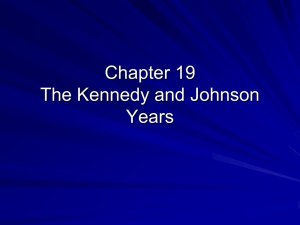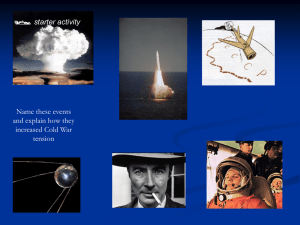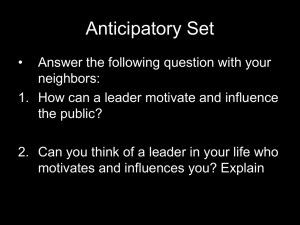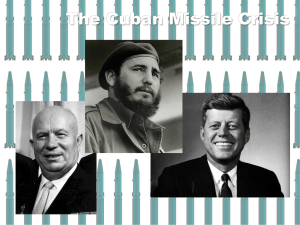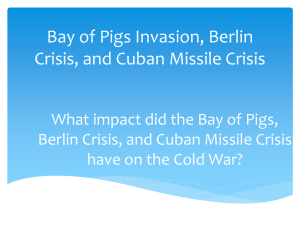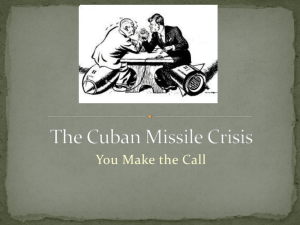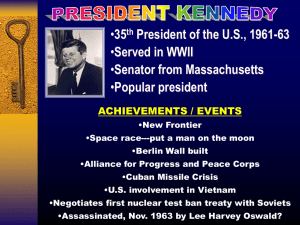Thirteen Days (2000) - Northern Illinois University
advertisement
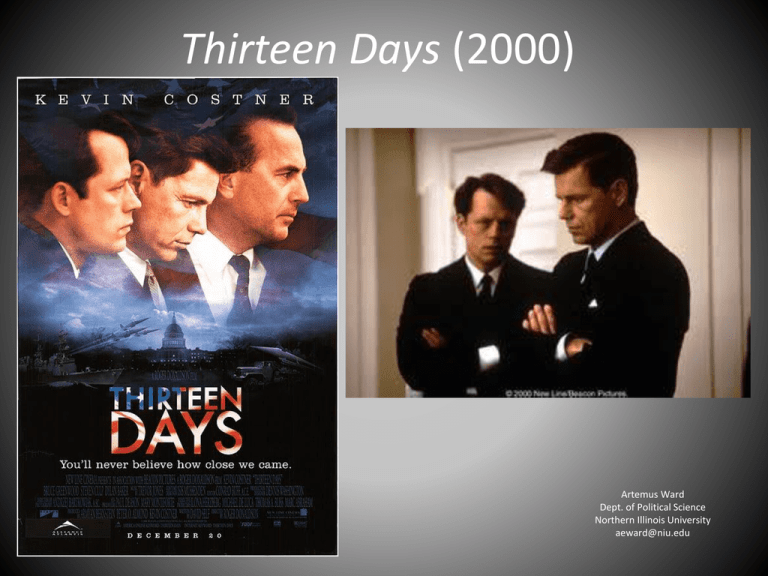
Thirteen Days (2000) Artemus Ward Dept. of Political Science Northern Illinois University aeward@niu.edu Introduction • The Kennedys had to overcome the legacy of their father— specifically his failed views of foreign policy in the run-up to WWII. • The Bay of Pigs was President Kenney’s first major foreign policy test and he failed miserably. He redoubled his efforts to oust Castro. • The Cuban Missile Crisis occurred with this history as prelude. • The film portrays the two-week period when the U.S. came to brink of nuclear war. At the same time, however, there are some major problems. • In this lecture we will go over some important background information and correct the misleading information in the film. Film’s Origin • While the movie carries the same name as the book Thirteen Days written by Bobby Kennedy in 1969, it is in fact based on a different book, The Kennedy Tapes: Inside the White House During the Cuban Missile Crisis by Ernest May and Philip Zelikow. • The Missiles of October (1974), was the TV film based on Kennedy's book. • The 2000 film contains some newly declassified information not available to the earlier production such as the shooting down of a U2 reconnaissance aircraft over Cuba during the crisis. Film Inaccuracies • Yet the film is historically inaccurate and misleading in at least two crucial ways. 1. Still living Kennedy administration officials and contemporary historians, including Arthur Schlesinger Jr., Advisor Ted Sorensen (above), and Secretary of Defense Robert McNamara, criticized the film for the depiction of Special Assistant Kenneth O'Donnell as chief motivator of Kennedy and others during the crisis. McNamara reacted in a PBS NewsHour interview: – "For God's sakes, Kenny O'Donnell didn't have any role whatsoever in the missile crisis; he was a political appointment secretary to the President; that's absurd." – According to McNamara, the duties performed by O'Donnell in the film are closer to the role Sorensen played during the actual crisis: "It was not Kenny O'Donnell who pulled us all together—it was Ted Sorensen." 2. The Kennedy’s preoccupation with overthrowing Castro and returning Cuba to a capitalist state under the American sphere of influence was downplayed at best and ignored at worst. The Cuban Missile Crisis cannot be decoupled from the Bay of Pigs and Operation Mongoose. In this sense the Kennedy’s were not the peace-loving, isolationists that many Kennedy-cult liberals make them out to be. The Film’s Reception • The film cost $80 million to make and returned $67 million box office worldwide – a commercial failure. • Critics were generally positive, though not overwhelmingly so. In the Shadow of Their Father: Overcoming the Legacy of Joseph P. Kennedy • The grandson of Irish immigrants, Joseph P. Kennedy (left) was the son of a local Boston saloon owner and political leader. • He graduated from Harvard and married Rose Fitzgerald, the daughter of Boston’s popular mayor John Francis “Honey Fitz” Fitzgerald; merging two of the city’s most prominent political families. • Joe Sr. went into banking and soon became an expert on the unregulated stock market. He made a fortune, selling just prior to the crash, and diversified his investments to real estate, importing liquor, and making movies in Hollywood. • President Roosevelt named him the first director of the new Securities and Exchange Commission. • His future seemed bright and he set his sights on the presidency. His goal: to become the first Irish-Catholic president. In the Shadow of Their Father: Overcoming the Legacy of Joseph P. Kennedy • • • • • In 1938, FDR appointed Kennedy as Ambassador to Britain at a time when the Nazis were intensifying their conquest of Europe. Kennedy aligned himself with British Prime Minister Neville Chamberlain (left) and supported appeasement of Hitler. Kennedy even sought private meetings with Hitler, with out FDR’s approval, was opposed to military and economic aid for Great Britain, retreated to the English countryside during the Nazi bombing of London—even when the Royal Family and British government remained in London—and was quoted in newspapers as saying that democracy was finished. A public outcry ensued and he lost the confidence of the Roosevelt administration. He resigned in November 1940 and went on to oppose FDR’s re-nomination for a third term as president in 1940. In the Shadow of Their Father: Overcoming the Legacy of Joseph P. Kennedy • Joe was afraid that his sons would be forced to go to war should the U.S. enter the conflict and positioned himself for a possible presidential run. • But his popularity was irretrievably low to allow for such a bid and he spent WWII on the sidelines while his sons went off to fight. • Joe and Rose had nine children including: – the eldest Joe Jr. who was killed at age 29 in WWII – the eldest daughter Rose Marie who was lobotomized at age 23 and institutionalized the rest of her life – and the second oldest daughter Kathleen “Kick” who was killed in a plane crash in Europe at 28. • Photo caption: • Joseph P. Kennedy Jr., Kathleen Kennedy, and John F. Kennedy, sons and daughter of United States Ambassador to England Joseph P. Kennedy Sr., arrive at the House of Parliament in London to hear Prime Minister Chamberlain's announcement that a state of war existed between England and Germany, September 1939. • By age 27, John—known as “Jack”—had lost his older brother, his sister Rosie, and four years later, Kick—the sister he was closest to. John F. Kennedy: War Hero • As a child and young man Jack was perennially sick and the never took anything seriously. He was a jokester always playing second-fiddle to his older brother Joe—his father’s favorite and the golden boy who everyone expected to be president one day. • Jack’s health problems disqualified him for the Army but through his father’s influence he was able to join the Navy and worked at a desk job. But he wanted to see action and after Pearl Harbor he was given command of a patrol torpedo (PT) boat. • His ship was rammed by a Japanese destroyer near the Solomon Islands in the south pacific, he rescued his crew, and was awarded a medal for his heroics. A subsequent Hollywood film called PT-109 (1963) starring Cliff Robertson portrays the incident. John F. Kennedy: Road to the White House 29-year-old John Kennedy campaigns for a congressional seat In the election of 1946. Seen here left to right are Ted Williams, Eddie Pellagrini, JFK and Hank Greenberg at Fenway Park, Boston. • After Joe Jr.’s death in the war, his father’s ambitions transferred on to Jack who was now expected to take his brother’s place and climb the political ladder on the way to becoming what his father, and now his dead brother, could not: the first Irish-Catholic president. • Jack won his bid for the U.S. House and Senate and married Jacqueline Bouvier. The Bay of Pigs • • • • • • • • Fidel Castro and the revolutionaries took control of Cuba in 1959 and moved quickly to transform the country from a capitalist economic system to a communist system. On their way out of office, the Eisenhower administration had created a plan to overthrow Castro. The plan, led by the CIA with help from the U.S. military, was for an invasion of Cuba by a counter-revolutionary insurgency composed of U.S.-trained antiCastro Cuban exiles led by CIA paramilitary officers. The intention was to invade Cuba and instigate an uprising among the Cuban people in hopes of removing Castro from power. A little over 3 months into his presidency, Jack approved the plan. But it failed miserably. The Soviet and Cuban governments knew the attack was coming. Indeed the CIA knew the Soviets knew but did not inform Kennedy. Two days before the invasion, the CIA secretly bombed Cuban airfields. When the Cuba accused the U.S. of the attacks, the U.S. denied it and claimed it was counterrevolutionaries. On April 17, 1961, 1,500 U.S.-trained Cubans landed on the island but no direct U.S. air support was provided. Within two days the Cuban government had captured or killed the invading exiles, and Kennedy was forced to negotiate for the release of the 1,189 survivors. After twenty months, Cuba released the captured exiles in exchange for $53 million worth of food and medicine. Castro felt the U.S. would most assuredly try again so he sought closer ties with the Soviet Union including a missile defense system. • This April 1961 file photo shows a group of Cuban counterrevolutionaries - members of Assault Brigade 2506 - after their capture in the failed U.S.-sponsored invasion, at Bay of Pigs, Cuba. (MIGUEL VINAS/AFP/Getty Images) Operation Mongoose • • • • • • • • After the Bay of Pigs, President Kennedy stepped up his pursuit of Castro and Cuba. He approved this CIA program of propaganda, psychological warfare, sabotage, and assassination attempts in order to foment a Cuban revolt. Bobby Kennedy was ultimately in charge of the program. 33 plans were considered and some were carried out including use of American Green Berets; destruction of Cuban sugar crops, oil refineries, sugar mill, power plants, bridges, and sawmills; and mining of harbors. One plan would have had the U.S. engage in real and simulated attacks, including terrorism inside the U.S., which would be blamed on the Cuban government. Many individual plans were devised by the CIA to assassinate Castro. Plans to discredit Castro in the eyes of the Cuban public included contaminating his clothing with chemicals that would make his trademark beard fall out and spraying a broadcasting studio with hallucinogens before a televised speech. Assassination plots included poisoning a box of Castro's favorite cigars, placing explosive seashells in his favorite diving spots, and providing a Cuban official with a ballpoint pen rigged with a poisonous hypodermic needle. Kennedy ordered a suspension of Operation Mongoose during the Cuban Missile Crisis but operations continued anyway. They were escalated after the Crisis eased. With a budget of $50 million per year and 2,500 personnel including 500 Americans the program lasted from 1961 to at least 1975 and possibly into the 1980s and even beyond. Ultimately Operation Mongoose failed and has been dubbed by critics as “the largest operation of international terrorism in the world.” “The Attorney General opened the meeting by saying that higher authority is concerned about progress on the MONGOOSE program sabotage operations..... He urged that “massive activity” be mounted within the entire MONGOOSE framework. There was a good deal of discussion about this, and General Lansdale said that another attempt will be made against the major target which has been the object of three unsuccessful missions, and that approximately six new ones are in the planning stage.” President John F. Kennedy: Cold Warrior • In 1961, Kennedy anxiously anticipated a summit with Soviet Premier Nikita Khrushchev. • The President started off on the wrong foot by reacting aggressively to a routine Khrushchev speech on Cold War confrontation in early 1961. The speech was intended for domestic audiences in the Soviet Union, but Kennedy interpreted it as a personal challenge. His mistake helped raise tensions going into the Vienna Summit of June 1961. • At the summit, Khrushchev got the better of Kennedy informing him of the Soviet’s intention to sign a treaty with East Berlin—a move to stem the tide of East Germans—particularly professionals—leaving the Soviet sphere of influence. In the weeks after, 20,000 people fled from East Berlin to the western sector. • Kennedy ordered a military buildup and said that any attack on West Berlin would be an attack on the U.S. In reaction, the Soviets and East Berlin erected a wall to stop the flow of people leaving. Attorney General Bobby Kennedy • • • • • • • • Robert “Bobby” Kennedy was 8 years younger than Jack and graduated from Harvard and Virginia Law School. He practiced law at the Department of Justice and was counsel to Senate committees, working with Jack during the rackets hearings against Jimmy Hoffa and the teamsters. He worked for Adlai Stevenson’s 1956 presidential campaign in order to gain experience and managed his brother’s 1960 campaign. After the victory, Jack named him Attorney General despite the fact that Bobby wanted to go into private practice. The appointment was criticized as some felt Bobby had little experience. Initially Bobby was not among Jack’s closest White House advisors as Bobby felt the Attorney General should not be a political post. But after the Bay of Pigs, Jack took his father’s advice and Bobby became his key adviser for the remainder of his presidency. During the crisis over Berlin, Bobby operated through a private backchannel connection to Soviet spy Georgi Bolshakov, relaying important diplomatic communications between the US and Soviet governments. Bobby helped set up the Vienna Summit meeting in June 1961 and later helped to defuse a tank standoff with the Soviets at Berlin’s Checkpoint Charlie in October. As the film demonstrates, Bobby’s advice and connections continued to be crucial during the Cuban Missile Crisis. • • • • • LeMay led bombing raids over Germany in WWII and was put in charge of aerial bombing in the Pacific Theater. He was in charge of the low-flying bombing runs that destroyed most of 66 Japanese cities. Precise figures are not available, but the fire-bombing campaign against Japan, directed by LeMay between March 1945 and the Japanese surrender in August 1945, may have killed more than 500,000 Japanese civilians and left 5 million homeless. After the war he placed in charge of the Strategic Air Command— modernizing for the jet and nuclear age. In 1951 at age 44 became the youngest person since Ulysses Grant to become a 4-star General. In 1961 he became Air Force Chief of Staff. LeMay had pressed for an immediate attack on Cuba as soon as the crisis began, and he still favored an attack even after the Soviets had withdrawn their missiles. LeMay told President Kennedy that he considered the resolution of the Cuban Missile Crisis the “greatest defeat in our history.” He retired from the military in 1965, published an autobiography explaining that he opposed what he saw as President Johnson’s relatively tame approach to fighting the Vietnam War (strategic air strikes and ground forces) and instead famously called for “bomb[ing] them back into the Stone Age.” President Nixon ultimately undertook a massive bombing campaign that many felt weakened the Communists and helped bring an end to the war. LeMay went on to be George Wallace’s vice-presidential running mate during his 1968 independent bid for president. LeMay died in 1990. General Curtis LeMay U.S.-Soviet Tensions • The U.S. had placed nuclear missiles that could strike Moscow in the UK in 1958 and in Turkey and Italy in 1961. • In the wake of the Bay of Pigs, the Cuban and Soviet governments secretly began to build bases in Cuba for a number of nuclear missiles that could strike most of the continental United States. • When the U.S. found out, the Cuban Missile Crisis ensued—generally regarded as the moment in which the Cold War came closest to turning into a nuclear conflict with unimaginable casualties and consequences for both the United States and the Soviet Union. Aftermath • Castro later said that he would have ordered nuclear missile strikes against the U.S. had the U.S. invaded, even though he knew that Cuba would have been destroyed. • In the weeks and months after the agreement, the Soviets removed the missile systems from Cuba. • 11 months after the agreement the U.S. deactivated and removed its missiles from bases in Turkey in Italy. • Another outcome was the establishment of a hotline between the Soviet Premier and the U.S. President so that direct phone calls could be made. • The president’s approval rating increased from 66% to 77% immediately after the crisis, though the American people did not know that Kennedy had agreed to remove the U.S. missiles. Secretary of Defense Robert McNamara • The movie showcases the central role played by Robert McNamara, then Secretary of Defense, who kept a close watch over the U.S. military to avoid starting a war by accident. • As an officer who served under Curtis LeMay in WWII, Lieutenant Colonel McNamara was in charge of evaluating the effectiveness of American bombing missions making him intimately familiar with LeMay when both were serving President Kennedy. • Errol Morris’ 2003 documentary The Fog of War: Eleven Lesson from the Life of Robert S. McNamara details his life and what he learned along the way. • McNamara explains that President Kennedy believed a primary responsibility of a president—indeed the primary responsibility of a president—is to keep the nation out of war, if at all possible. Why Did the Soviets Put Missiles in Cuba? • Because the Soviets were evil? • Because they wanted to destroy America? • In 1989 McNamara met with former Soviet and Cuban officials and said: “If I had been a Cuban leader, I think I might have expected a U.S. invasion. Why? Because the U.S. had carried out what I have referred to publicly as a debacle--the Bay of Pigs invasion... Secondly, there were covert operations. The Cubans knew that. There were covert operations extending over a long period of time."

